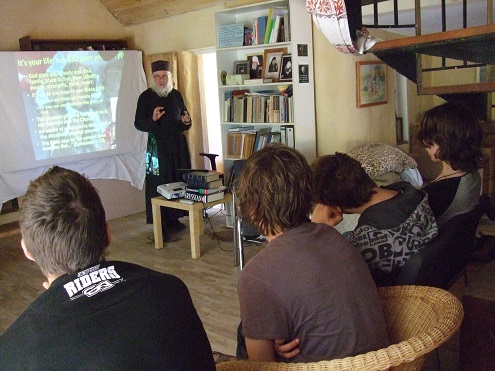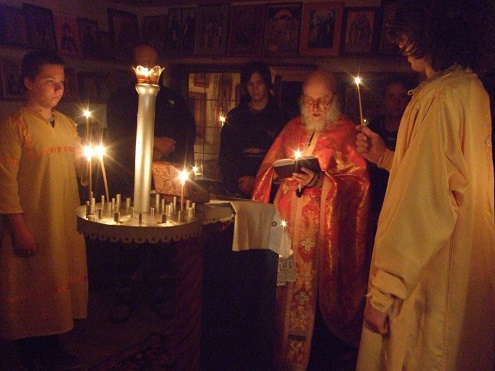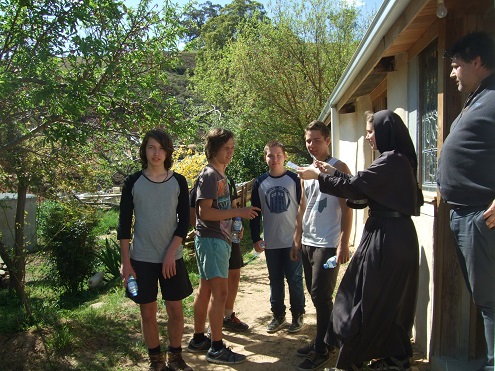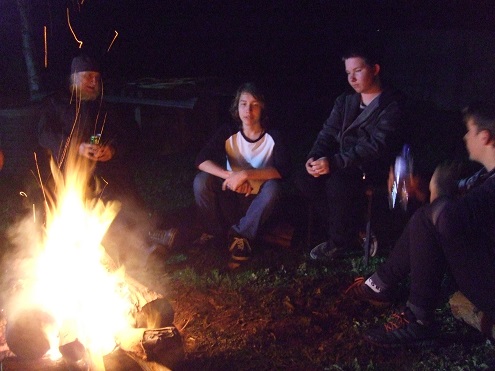Monday, September 28, 2015
Exaltation of the Cross - Camp
From September 25-27, a group of young people came to the Annunciation Hermitage for a camp.

They made and erected a Cross on “Mount Tabor” above the monastery.

 Carpentry skills by the boys were put to good use. Some of the boys helped with the iconography, whilst the rest had the difficult task of digging a deep hole in the rocky ground. The tropar and other hymns to the Cross were sung.
Carpentry skills by the boys were put to good use. Some of the boys helped with the iconography, whilst the rest had the difficult task of digging a deep hole in the rocky ground. The tropar and other hymns to the Cross were sung.

The participants had five lectures and discussions on the Law of God.


They prayed at the services morning and evening, and took part of Holy Communion.

 A competition - the teams were handed the first question, which started them off on a search for ongoing clues hidden all over the monastery property. Competing team members share experiences on the challenges of the competition track - quick decisions had to be made during the race.
A competition - the teams were handed the first question, which started them off on a search for ongoing clues hidden all over the monastery property. Competing team members share experiences on the challenges of the competition track - quick decisions had to be made during the race.

A campfire with discussions about ancient Rome, the first Christians, and tall tales.

Tuesday, September 8, 2015
Abbess Alexandra: On Christian love (conference report)
Love is the only thing that can not be demanded. You can cry when it is not present, and rejoice when it is. People are mistaken when they demand love.
Saint John of Shanghai
 Speaking of Christian love, let us first of all turn to St. Ignatius Brianchaninov, in whose works we find all the priceless teachings the Fathers have left us, who theoretically and and by experience internalised the Gospel teaching.
Speaking of Christian love, let us first of all turn to St. Ignatius Brianchaninov, in whose works we find all the priceless teachings the Fathers have left us, who theoretically and and by experience internalised the Gospel teaching.
He writes:
We know from the Fathers that there are two kinds of love for neighbour: the natural and the evangelical, which is love in Christ. Natural love has been planted in us at creation, and therefore it is certainly present in every human being. It has been damaged, just like the other good human properties, by the fall, or the ancestral sin. Therefore, each person is subject to more or less damage, short or long-lasting changes. Christ heals all our diseases in a marvelous way, also heals our damaged love: He commands people to love Himself - the Lord - in a man. This brings love up to the highest degree of fervour, gives it purity, spirituality, a sanctuary. Likewise, the flame of love in Christ extinguishes the discordant, smoky flame of carnal love - which consists of a mixture of dreamy, non-existent delight and brutal, murderous torment. The feeling of spiritual love guided the pen of St. John of the Ladder, when he said: “Love of God extinguishes our love for our parents. And so he who says that he has both deceives himself.” He also said: “he is pure who expels fleshly love with divine love, who has extinguished the fire of passion by the fire of heaven (i.e. the Holy Spirit)” When we look at ourselves with attention we will see, with God’s help (God’s help is needed for such a vision! This vision is the gift of God!), that we mostly have a natural love, and have yet to acquire the evangelical love [1].
Give homage to your neighbour as to the image of God - a respect within your soul, which is invisible to others, which is clear only to your conscience. Let your activity be mysteriously conformable to your state of mind.
Give homage to your neighbour, without distinction to age, gender, class - and gradually holy love will be revealed in your heart.
The reason for this holy love is not flesh and blood, not the drive of the senses - but God.
Give homage both to the blind and the leper, and the one with a mental disorder, to infants, and criminals, and pagans show reverence as to the image of God. What are their weaknesses and shortcomings to you! Watch yourself, that you do fall short in love.
In a christian, give reverence to Christ, Who said in His instructions, and also will say when our eternal fate is pronounced: “Inasmuch as ye have done it unto one of the least of these my brethren, ye have done it unto me.” (Matt. 25.40).
In your relation to your fellow man, keep in mind this saying of the Gospel, and you will be made a confidant of love for neighbor.
The confidant of love of neighbor enters into the love of God by it.
But if you think that you love God, and in your heart there lives an unpleasant attitude to even one person, then you are in grievous self-delusion.
St John the Evangelist says: “If a man say, I love God, and hateth his brother, he is a liar…this commandment have we from him, That he who loveth God love his brother also.[2]
The Gospel rejects the love that depends on the movement of blood from the feelings of the carnal heart. The fall subjected the heart to the dominion of blood, and by blood, to the sovereignty of the prince of this world. The Gospel frees the heart from this bondage, from this violence, and leads it to the guidance of the Holy Spirit.
The Holy Spirit teaches us to love our neighbor in holiness. Love which is lit and fueled by the Holy Spirit is a fire. This fire extinguishes the fire of natural, carnal love, which is damaged by the Fall.
What a fallen state our nature is in! He who by nature is capable of vehemently loving his neighbour, has to force himself extraordinarily to love his neighbour in the way commanded by the Gospel. The flame of natural love easily turns into disgust, into an implacable hatred.
How plagued our natural love is! What a grievous wound to her is passion! Possessed by passion, the heart is capable of any injustice, any iniquity, just to satisfy its morbid love. Natural love gives his favourite only what is earthly, for it does not think of heaven. It rebels against heaven and the Holy Spirit, because the Spirit calls for the crucifixion of the flesh. It rebels against heaven and the Holy Spirit, because it is under the control of an evil spirit, the unclean spirit of one perishing.[3][/quote]
For every Christian (and especially for monastics) it is very important to understand what passion is and how it differs from love in Christ. I will bring your attention to a conversation of Bishop Photios of Triaditza with monastics on this topic.
“Often we confuse love with passion, passion for man … In fact, it is not the person it is difficult to leave, abandoning him himself. We could leave him to God, but it is difficult for us to deny ourselves, deny our own desire for a person, our attraction to the person. This is passion.
Passion is a manifestation of our self-love. It is very dangerous and extremely harmful to the spiritual life. Love is pure and disinterested; passion is something quite different. Passion is a morbid fascination, the soul cleaving to a specific person. This is constant thoughts of him, how he sees me; a special excitement and satisfaction, an agreeableness, when that person pays attention to us; and vice versa - unsettledness, depression, moodiness when that person does not have a friendly attitude to us or does not behave as we would like. In all this - God forbid - it is possible to go to the lowest depths. I do not wish to speak about this. We should wage an uncompromising struggle with these things, even fighting unto blood. Otherwise, self-love will remain the guiding principle in our lives, in our existence. The Lord tells us that it is impossible to serve two masters - this we know.
I think that we are afraid; the voice of our self-love does not give us trust in the Lord until the end, trust in the truth that the life of the soul can be purchased in its entirety only in the communion with God. Yes, we do not have any similar experience; we are sinful, unclean creatures. As she moves away from God, the soul is hungry, poor, wandering the world like a stranger, rejected by all. And then the soul begins to become attached to one soul, or the other. This is obviously a terrible self-deception, a serious illness. The soul is trying to find in another soul some kind of a world, in which to find satisfaction, pleasure for her selfishness. Here we must be uncompromising, strict to the end, otherwise we will remain in captivity to our selfishness.
If someone seems nice to you and your heart is drawn towards him, it does not mean that you love him. If this enthusiasm continues, you yourself will soon learn what treacherous, even tyrannical claims your soul presents with respect to this “dear” man. You will see how your soul can not stand that man’s independence from you, she is jealous and demands love for herself, demands that the subject of your love be slavishly devoted to you.
And your soul is ready to retaliate if this affection grows cold! We see that in this case everything rests on self-love, on the expansion of one’s own possessions in this world: “What I like - this is mine. It is in some way belongs to me.” For the most part this “cute” man is a door to a new, interesting and enjoyable small world trust for your heart. At the beginning you just want to enjoy this world as a little garden, and then you wish to put a small house there. When you are strolling through the garden, you no longer admire what is planted in it, but rather, yourself. This is the most disgusting of partiality in false love. Therefore, I repeat that here we really have to be uncompromising.
“True Love - says Saint Paul - seeketh not her own” (1 Cor. 13:5). Pure love is unselfish. It is generally quite alien to be possessive of what you love, because it is love in the Lord. Love in the Lord always respects the freedom of the other, and always loves man in Christ. It is difficult to understand this for us, because we are not committed, there is no trust and openness to the Lord, in order to make an effort in this direction. When a man fights, when he knocks, the Lord eventually opens. And then all these truths become clear to the mind, she knows them in her inner experience. Then the soul rejoices, because the truth has become her own private treasure. She rejoices because in her quest, in her struggle against all that separates her from the Lord, she is seeing a stronger stream of light in the tunnel; She rejoices because this brings her to God, and this joy is natural from her perspective - yet it is supernatural in terms of our fallen state.”
Abbess Alexandra
[1] Meeting of the letters of St. Ignatius, Bishop of the Caucasus. Publication Research Center, the protection and restoration of the heritage of the priest Paul Florensky. M., 1993. p. 153
[2] St. Ignatius (Bryanchaninov). Ascetic experience. T. 1. M., “Rule of Faith”, 1993, p. 125-126
[3] St. Ignatius (Bryanchaninov). Ascetic experience. T. 1. M., “Rule of Faith”, 1993, p. 121-122





